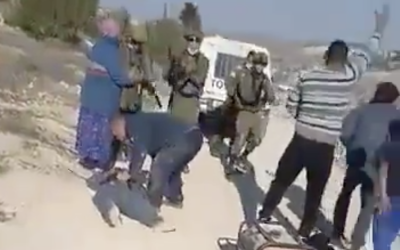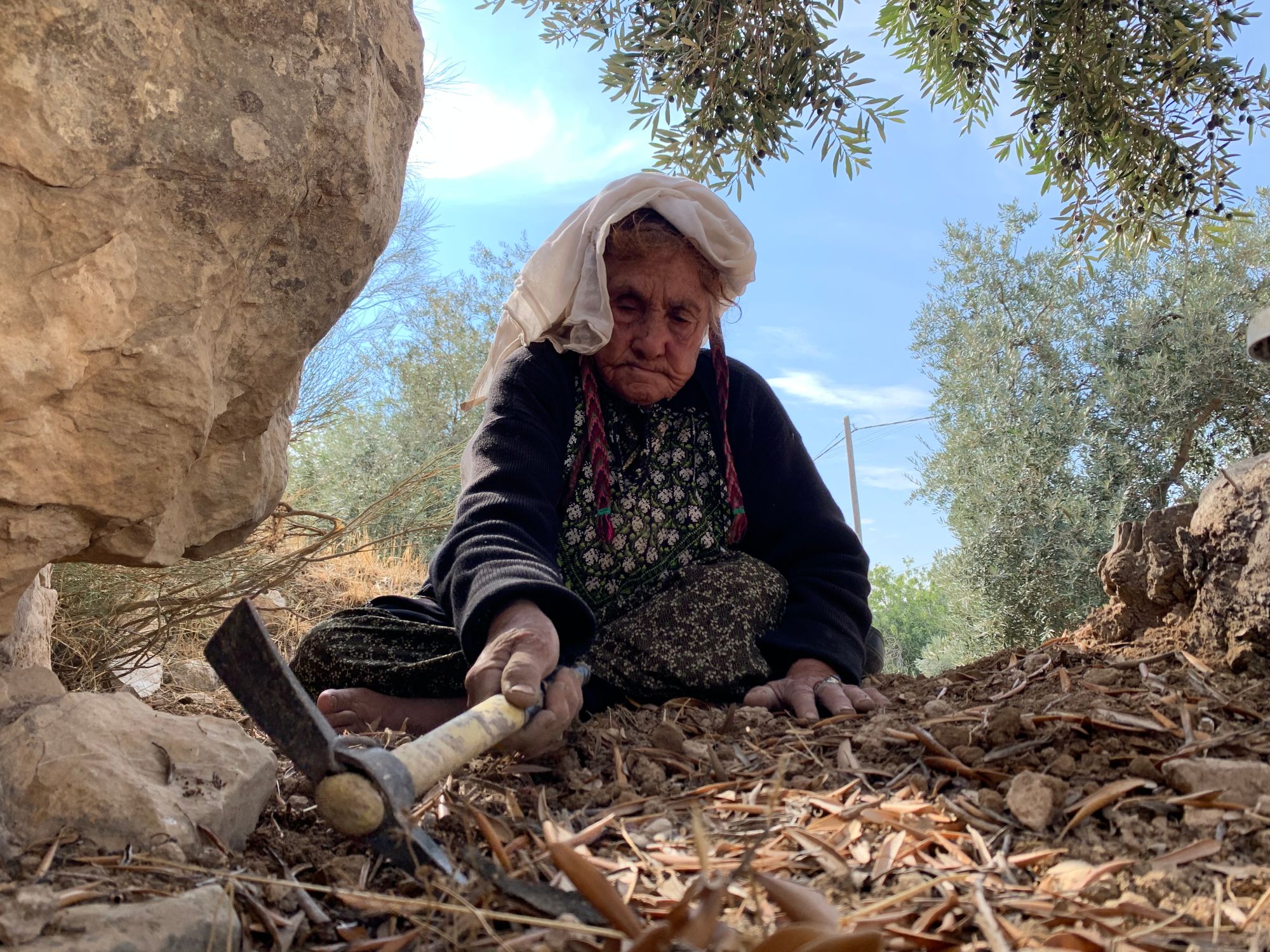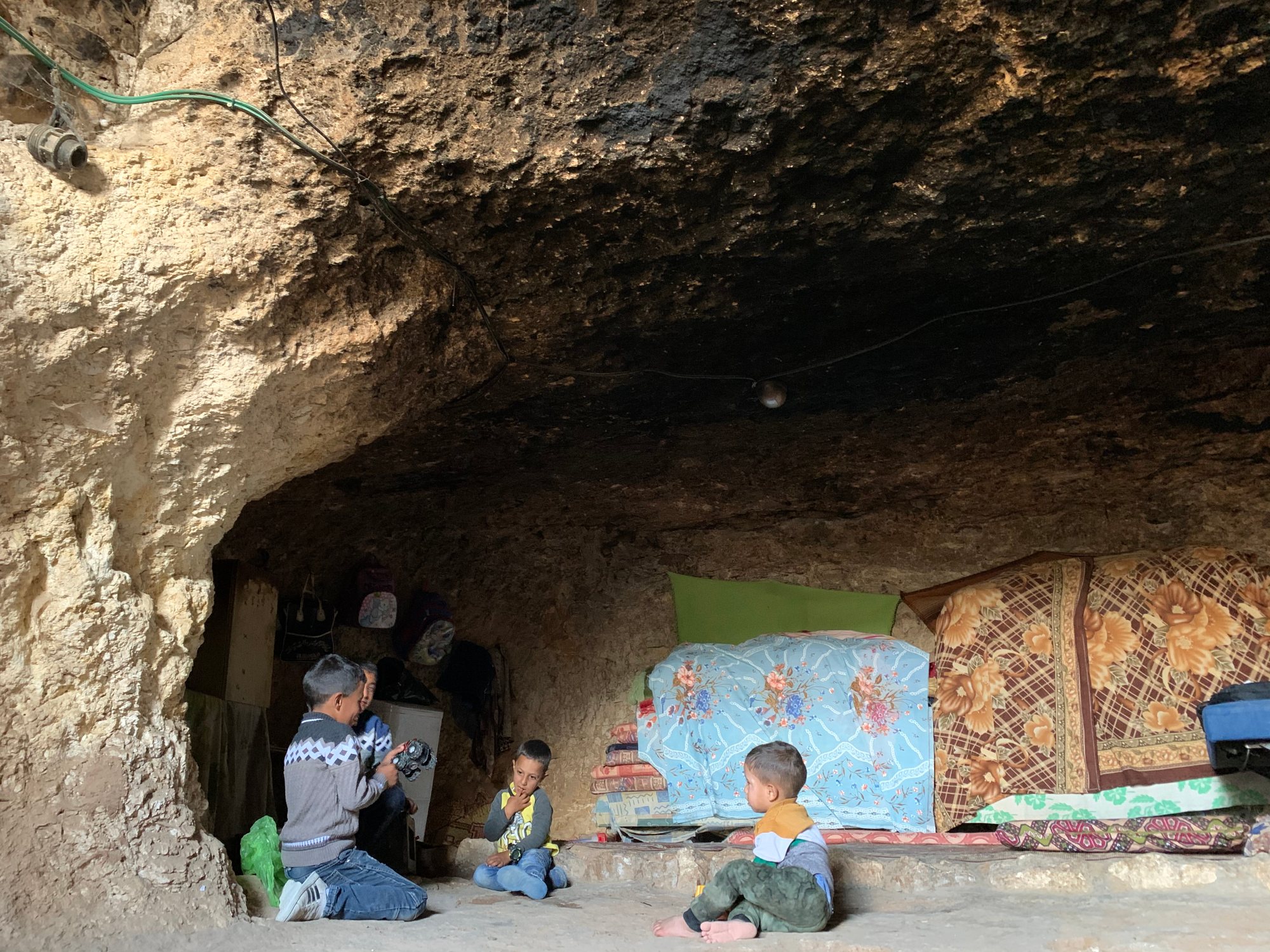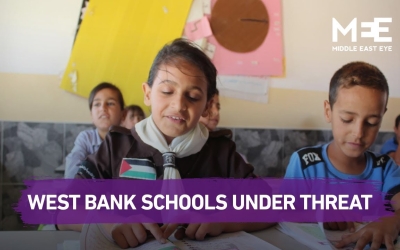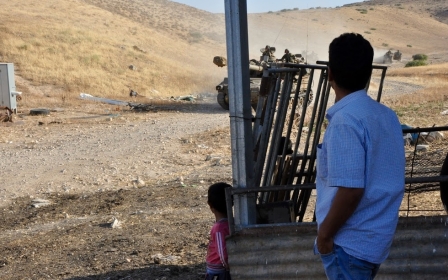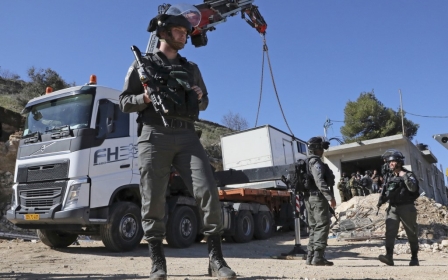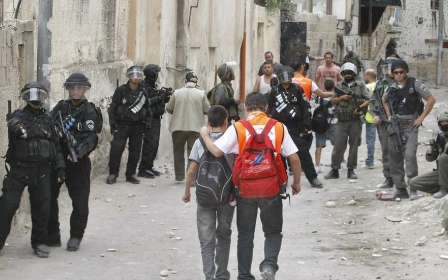Masafer Yatta: A Palestinian community under pressure
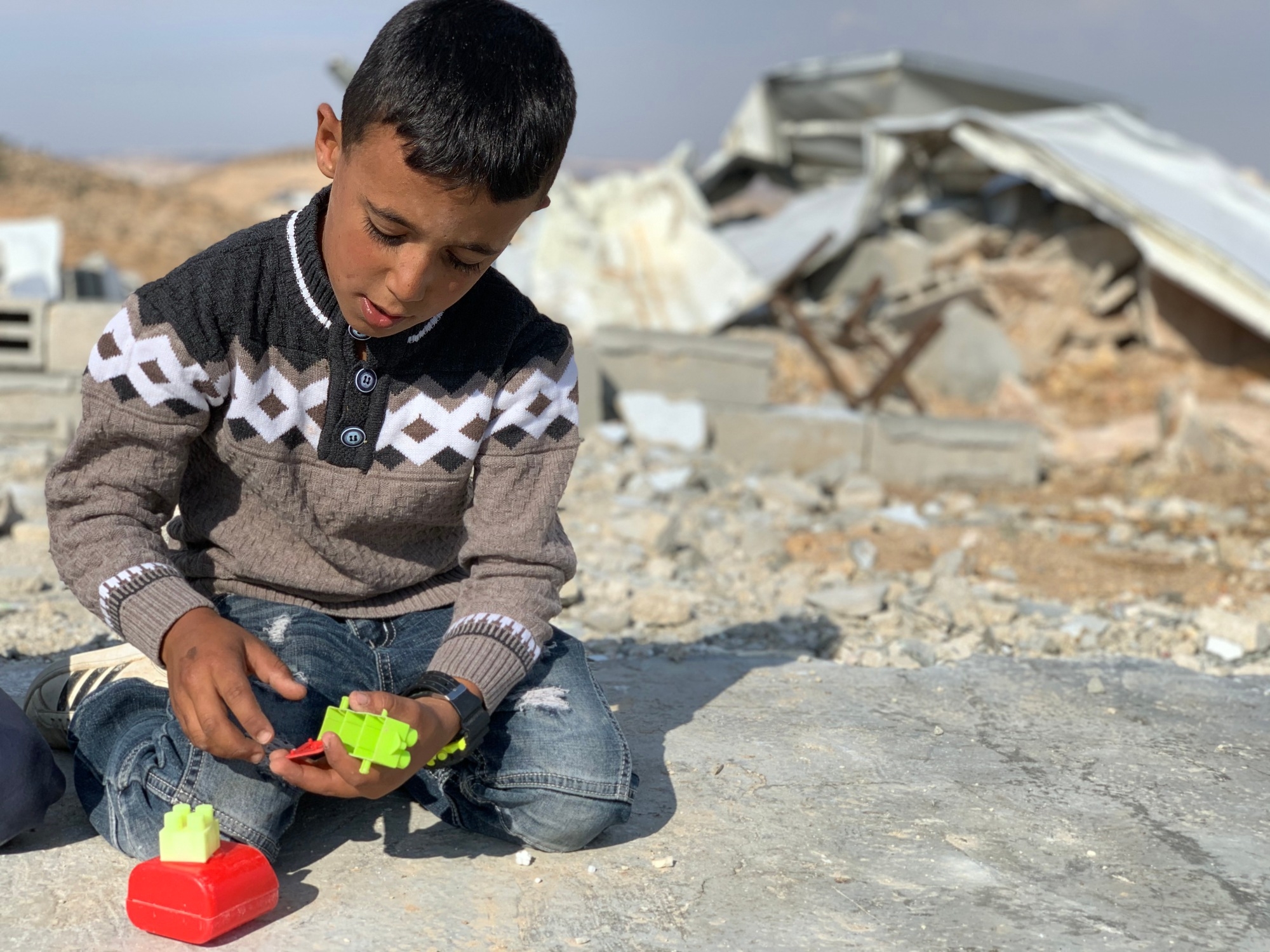
More than three weeks after he was shot in the neck by an Israeli soldier, Harun Abu Aram is still hanging between life and death.
The 23-year-old Palestinian had attempted, barefoot, to prevent soldiers from confiscating his power generator, the family’s only source of electricity, on 1 January in the area of Masafer Yatta, near the southern occupied West Bank city of Hebron.
New MEE newsletter: Jerusalem Dispatch
Sign up to get the latest insights and analysis on Israel-Palestine, alongside Turkey Unpacked and other MEE newsletters
While Abu Aram’s case has sparked outrage as yet another violent incident under the Israeli occupation, Palestinian residents of the embattled area say the raid that day was part of a longstanding Israeli crackdown on Palestinians in Masafer Yatta, in an effort to displace them from the area.
Home demolitions, confiscation of the most basic infrastructure and military training exercises are part of everyday reality in the area, forcing many to live in natural caves, as they vow to stay in Masafer Yatta no matter what the obstacles.
Toys under rubble
“I do not know if I am going to see my son alive again. He is still in the intensive care unit, surrounded by [medical] equipment,” Harun’s father, Fares Abu Aram, told Middle East Eye.
Abu Aram was due to get married. Doctors have told Fares, 52, that if his son is lucky enough to survive, the bullet that directly hit his spinal cord will leave him as a paraplegic.
"All I am asking for is to see my son alive again and celebrate his wedding as we have always dreamed of," Fares said.
This was not Abu Aram’s first experience with the Israeli army. Only 20 days before he was shot, his home was one of several Palestinian houses demolished by Israeli authorities in the area of al-Rakeez in Masafer Yatta.
A cluster of Palestinian hamlets mainly working in agriculture, Masafer Yatta is disconnected from any water, electricity and sewage networks due to an Israeli ban on Palestinian construction in the area. A number of illegal Israeli settlements in the area have meanwhile been built unimpeded.
“Israel chases us every day and makes our lives even harder,” Fares Abu Aram said. “All this is to force us to leave our ancestors' heritage. That is never going to happen. There is no alternative for us but to stay here until we die."
Close to the remains of Abu Aram's home, eight-year-old Adham searches for his Lego blocks in the rubble of his own demolished house.
On 30 September, Adham was at school when Israeli soldiers and the Israeli Civil Administration - the military body administering the West Bank - evacuated his home in al-Rakeez.
When he returned home, he found his house and toys destroyed.
"I had lots of cars and Lego bricks […] I still look for them every day, but cannot find them, the only ones I found are destroyed,” Adham told MEE. “I keep having dreams that the [Israeli] army has come back and destroyed our house again.”
Concern visible on his face as he lights another cigarette, Adham’s father, 42-year-old Murad Khalil al-Hamamda, sits near the ruins of his home.
"The Israeli government gives everything to (Israeli) settlers in order to consolidate their presence and evict us,” he says. “Meanwhile, our government [the Palestinian Authority] neglects us and leaves us alone in our struggle."
Hamamda said that Israeli authorities claim his house, which he built three years ago, is located in a military training zone.
"These are our lands, which we inherited from our ancestors, and we have the papers and documents that prove that,” he explained. “They just seek to expel us under the pretext of establishing military training zones, while they let settlers build and expand."
Hamamda, his wife and five children now live in a “cold and wet” stone cave, which floods whenever it rains, forcing the parents to wake up early and evacuate the water before it reaches their sleeping children.
"Today we live in a cave in difficult conditions, all so we can stay on our land as one family,” he said. “We will not leave our land to go anywhere except to the grave.”
Long legal battles
Palestinians in al-Rakeez are not an isolated case. The 12 Palestinian communities in Masafer Yatta are currently under threat, with some 600 people in four communities at risk of imminent eviction, according to Masafer Yatta community council head, Nidal Younis.
The area of Masafer Yatta comprises about 10,000 hectares, of which more than two-thirds were occupied by Israel in 1967, forcibly displacing its Palestinian residents.
Younis told MEE that 3,500 hectares on which Palestinians reside today are now classified as closed military zones, or Firing Zone 918, since 1981.
In many Palestinian communities located in Area C of the West Bank under full Israeli military control, Israeli-designated “firing zones” or “closed military zones” are forbidden for Palestinians to live on without permission from the Israeli authorities, which is rarely granted. These declarations have had a serious humanitarian impact on Palestinian civilians and dramatically reduced the land available to them for residential and livelihood use.
Since the 1980s, Younis said, the Israeli army has incrementally stepped up its measures against Palestinians in Masafer Yatta, as many families have turned to living in caves in order to stay on their lands.
In recent years, the communities of al-Fakhit, al-Tabaan, al-Majaz and al-Halawa have been embroiled in a legal battle. In August last year, an Israeli court ruled to grant the Israeli Civil Administration and the local Palestinian population another opportunity to discuss the matter.
However, the Civil Administration has since escalated home demolitions and prosecutions against residents of Masafer Yatta.
Haitham Abu Sabha, an activist from al-Fakhit, told MEE that Israel claims that Palestinians only came to Masafer Yatta in the 1980s.
“But we have documents confirming that our ancestors were here hundreds of years ago,” Abu Sabha said.
"In 1999, the four [Palestinian communities] were forcibly evicted, but we obtained a precautionary order from the Israeli Supreme Court stating that we could return - but without specifying how to return, and without clauses allowing us to establish any infrastructure,” he added.
“In 2012, this precautionary decision was cancelled, and Palestinians became threatened with eviction again. Every building is now under threat of demolition."
'We will not leave our land to go anywhere except to the grave'
- Murad al-Hamamda, resident of al-Rakeez
In 2014, the Israeli Civil Administration offered a deal allowing Palestinian communities to gather only in certain areas, in order for the rest of Masafer Yatta to be turned into military zones.
"We rejected this deal, and we will reject any other eviction deals,” Abu Sabha said. “We live on lands that we inherited from our ancestors.
"Even if they demolish our homes, we will return to live in caves as our ancestors used to,” he added.
The Israeli army is not alone in pressuring the Palestinian residents of Masafer Yatta. Younis says that areas that do not fall within Firing Zone 918 are surrounded by a "settlement belt" and residents face daily harassment by Israeli settlers.
"The settlers chase Palestinian shepherds, kidnap and beat them, and then hand them over to the Israeli army, while also preventing Palestinians from herding sheep,” Younis said.
In the nearby village of Tuwani, Palestinian activists from all communities of Masafer Yatta established the People's Committee for Protection and Resilience in 2018, in order to fight against Israeli policies pushing for their displacement.
“The committee was established with the support of the area's youth, and aims mainly to form an internal network that is not linked to any external body,” Fouad al-Amor, a 35-year-old resident of Tuwani and one of the founding activists of the committee, told MEE.
“It works to monitor, document and report (Israeli) attacks, and to form groups that combat such attacks and support Palestinian residents in doing so.”
Sheltering in caves
Jaber al-Dababsa and his brother Amer saw their homes in the hamlet of Khallet al-Dabaa demolished on 25 October.
Since then, they and their families have moved to a 10-metre-wide cave near the ruins of their home, like many in the area whose homes have been flattened over the years.
Dababsa, a 35-year-old father of five, tells MEE that he started building his 90-square-metre house from bricks and tin sheets a year ago.
He said he did not receive any stop-work orders or notice of demolition.
"I was surprised to see the vehicles storming the place, starting with demolishing my house and my brother's, without even letting us take out what was inside," he recalls.
Dababsa asserts that his family possesses documents that prove their ownership of the land, but that “Israeli authorities refuse to consider these documents” as they consider Khallet al-Dabaa to be within a firing zone.
“Today my children live in cold conditions and are deprived of living in a home. We are forced to do so, and there is no other shelter for us,” Dababsa added.
Living conditions for residents of Khallet al-Dabaa become even harsher during Israeli military training in the area, which takes place once or twice a year.
At that time, Palestinian homes are subjected to close inspection, and all green clothes are confiscated under the pretext that they are the colour of the army's uniform.
"Despite their recurrence, it has never become normal for us and our children, who experience terror and fear during training, hearing gunfire and explosions, as well as the noises of military aircraft landing or flying in the area," Dababsa said.
During recent military exercises in Khallet al-Dabaa, a military helicopter landed near the local school while the children were attending classes.
Rayan Jaber al-Dababsa, Jaber Dababsa’s 10-year-old son, documented the military exercises he witnessed with his drawings.
“When I saw the planes, I thought that they were going to bomb our house with missiles and kill my family," he told MEE.
The Khallet al-Dabaa school was previously demolished and is now once again threatened with demolition.
School principal Raed Hadeeb insisted that the possible new demolition of the school would not mean surrender for him, nor for the schoolteachers and the 11 students in its two small classrooms.
“We expect that the school will be demolished at any time, and we are also preparing to continue educational efforts in harsher and more difficult circumstances,” he told MEE. “Demolishing the school is part of their plan to expel residents from the region, who refuse that."
Middle East Eye delivers independent and unrivalled coverage and analysis of the Middle East, North Africa and beyond. To learn more about republishing this content and the associated fees, please fill out this form. More about MEE can be found here.


